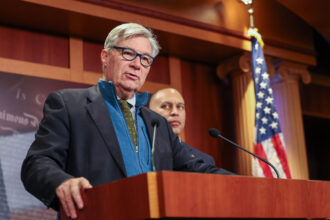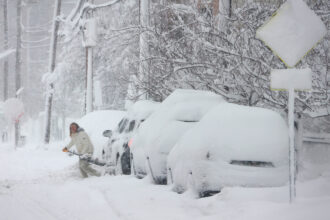Indonesia plans to class large areas of its remaining natural forests as “degraded” land in order to cut them down and receive nearly $1bn of climate aid for replanting them with palm trees and biofuel crops, according to Greenpeace International.
According to internal government documents from the forestry, agriculture and energy departments in Jakarta, the areas of land earmarked for industrial plantation expansion in the next 20 years include 37 million hectares of existing natural forest – 50% of the country’s orangutan habitat and 80% of its carbon-rich peatland. More than 60 million hectares – an area nearly five times the size of England – could be converted to palm oil and biofuel production in the next 20 years, say the papers.
“The land is roughly equivalent to all the currently undeveloped land in Indonesia,” says the report. “The government plans for a trebling of pulp and paper production by 2015 and a doubling of palm oil production by 2020.”
The result, says the environmental group in a report released in Jakarta today, would be to massively expand Indonesia’s palm, paper and biofuel industries in the name of “rehabilitating” land, while at the same time allowing its powerful forestry industry to carry on business as usual and to collect international carbon funds.
“[Money] earmarked for forest protection may actually be used to subsidise their destruction with significant climate, wildlife and social costs,” said the report.
The report comes at a critical time in global climate talks, due to resume next week in Cancun, Mexico. Forestry and peatland contribute nearly 18% of all global carbon emissions and Indonesia is negotiating a model $1bn forestry deal with Norway and the US. This could save millions of tons of climate emissions in return for Indonesia agreeing to a moratorium on future forest and peatland clearances.
But weak legal definitions of “forest” and “degraded land”, have allowed the global logging industry and officials in some governments to take advantage of an ambitious UN forest-reform scheme known as REDD (Reduced emissions from deforestation and degradation). This would pay countries to replant trees and restore land. Indonesia has pledged drastic action to reduce its greenhouse gas emissions by 26% on its own and 42% with international climate aid. If it agrees to a binding deal to limit deforestation, says Greenpeace, this would send a powerful message to other forested countries.
“A strong deal to prevent the destruction of natural forests and peatlands would put the troubled climate talks back on track. But if international money intended to support the protection of forests and peatland is allowed to enable their destruction, any confidence in the UN talks is expected to dissolve,” said a Greenpeace spokeswoman.
The Indonesian and Norwegian governments last night declined to respond until they had seen the report.
(Photo of teak harvest in Burma, 2007, courtesy of United Nations.)
(Article republished with permission)
About This Story
Perhaps you noticed: This story, like all the news we publish, is free to read. That’s because Inside Climate News is a 501c3 nonprofit organization. We do not charge a subscription fee, lock our news behind a paywall, or clutter our website with ads. We make our news on climate and the environment freely available to you and anyone who wants it.
That’s not all. We also share our news for free with scores of other media organizations around the country. Many of them can’t afford to do environmental journalism of their own. We’ve built bureaus from coast to coast to report local stories, collaborate with local newsrooms and co-publish articles so that this vital work is shared as widely as possible.
Two of us launched ICN in 2007. Six years later we earned a Pulitzer Prize for National Reporting, and now we run the oldest and largest dedicated climate newsroom in the nation. We tell the story in all its complexity. We hold polluters accountable. We expose environmental injustice. We debunk misinformation. We scrutinize solutions and inspire action.
Donations from readers like you fund every aspect of what we do. If you don’t already, will you support our ongoing work, our reporting on the biggest crisis facing our planet, and help us reach even more readers in more places?
Please take a moment to make a tax-deductible donation. Every one of them makes a difference.
Thank you,











